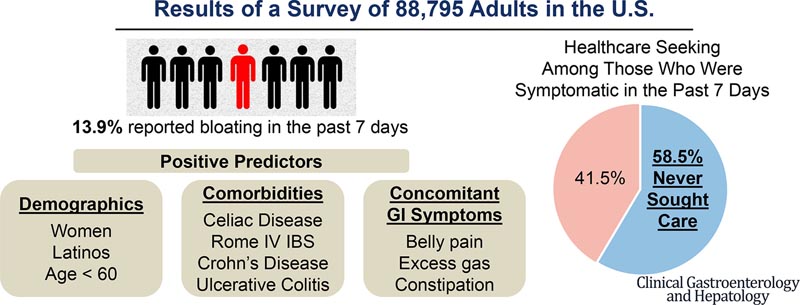Summary Background Although abdominal distension is a common symptom, comparatively little is known about its prevalence in the community. This study aimed to examine the prevalence of bloating and evaluate related health care seeking using survey data from a nationally representative sample of nearly 89,000 Americans. Methods Participants completed the National GI Survey II to measure the presence and severity of gastrointestinal symptoms, including bloating. We assessed the prevalence of abdominal distension in the past 7 days, as well as the severity and seeking medical attention for abdominal distension. Multivariable regression was performed to identify associations between outcomes and covariates. Results Of 88,795 respondents, 12,324 (13.9%) reported swelling in the past 7 days. Women and those with comorbidities (e.g., irritable bowel syndrome, chronic constipation, ulcerative colitis) and concomitant gastrointestinal symptoms (e.g., abdominal pain, excessive gas) had higher odds of abdominal bloating (all p< 0.001). The above factors also predicted more severe swelling (all p<0.001). Among those who reported recent swelling, 58.5% never sought care for swelling; 29% of whom had self-monitoring symptoms or felt uncomfortable talking to their providers. Conclusions Bloating is common in the community, with nearly one in seven Americans experiencing this symptom in the past week. Women and those with certain comorbidities and concomitant gastrointestinal symptoms are more likely to experience bloating and more severe symptoms. Nearly one-third of patients who have not sought care are managing symptoms on their own or feel uncomfortable discussing it with their providers, emphasizing that efforts should be made to proactively ask about bloating. |

Comments
Women were more than twice as likely as men to report feeling bloated
Nearly 1 in 7 Americans experience bloating weekly, and most do not seek professional care, according to a new study led by Cedars-Sinai researchers. The findings are published in Clinical Gastroenterology and Hepatology .
"Although bloating is a common symptom, some patients may not mention it to their doctors," said Janice Oh, MD, a resident physician in the Division of General Internal Medicine at Cedars-Sinai and first author of the study. “It is important for people to feel comfortable talking about swelling because it could be a symptom of a serious condition and there are treatments available.”
Bloating can make people feel bloated or tight in the abdomen. It can occur when a person’s gastrointestinal tract fills with air or gas and can sometimes be the result of diet or an underlying condition, such as irritable bowel syndrome, carbohydrate enzyme deficiency, or chronic constipation. .
To understand the extent of bloat in the U.S., the authors sent an email survey to nearly 90,000 people. Of the 88,795 people who completed the survey between May and June 2020, 12,324 (13.9%) reported swelling in the past seven days.
"To our knowledge, this is one of the largest studies of bloating in the US," said Brennan Spiegel, MD, MSHS, director of Health Services Research at Cedars-Sinai and lead author of the study. "Anecdotally, we often hear about bloating in the clinic, but this study adds concrete evidence to describe how often it occurs and what other conditions it is associated with."
Of people who reported experiencing bloating, about 58.5% said they had never sought care for their symptoms.
Some of the reasons they gave for not seeking care were that the swelling resolved on its own (32.5%), it was not bothersome (29.9%), they were able to control it with over-the-counter medications or lifestyle changes (20.8%), did not have health insurance (10.2%) or time to go to the doctor (9%), or did not feel comfortable discussing bloating with a healthcare provider (8.5%).
Women were also more than twice as likely as men to report bloating.
"Other studies have also found that women report more bloating than men, and researchers have proposed several hypotheses as to why this may be occurring," Oh explained. “These include hormonal, metabolic, psychosocial, lifestyle and dietary differences between men and women.”
Latinos and people under 60 were also more likely to report bloating in the past seven days, as were people with medical conditions such as irritable bowel syndrome, chronic constipation and ulcerative colitis. People with related gastrointestinal symptoms, such as abdominal pain and excess gas, were also more likely to experience bloating.
“Bloating can often be controlled effectively with various medications, such as antibiotics targeting the gut or treatments that affect serotonin levels in the gut. There is also evidence that lifestyle changes can help, including exercise such as core strengthening, as well as dietary changes , but it requires a discussion with a healthcare provider about what might be causing the swelling. ”Oh said.
More studies are needed to investigate the causes of swelling and how best to treat it, according to researchers.
Funding: The study was funded by Ironwood Pharmaceuticals.















